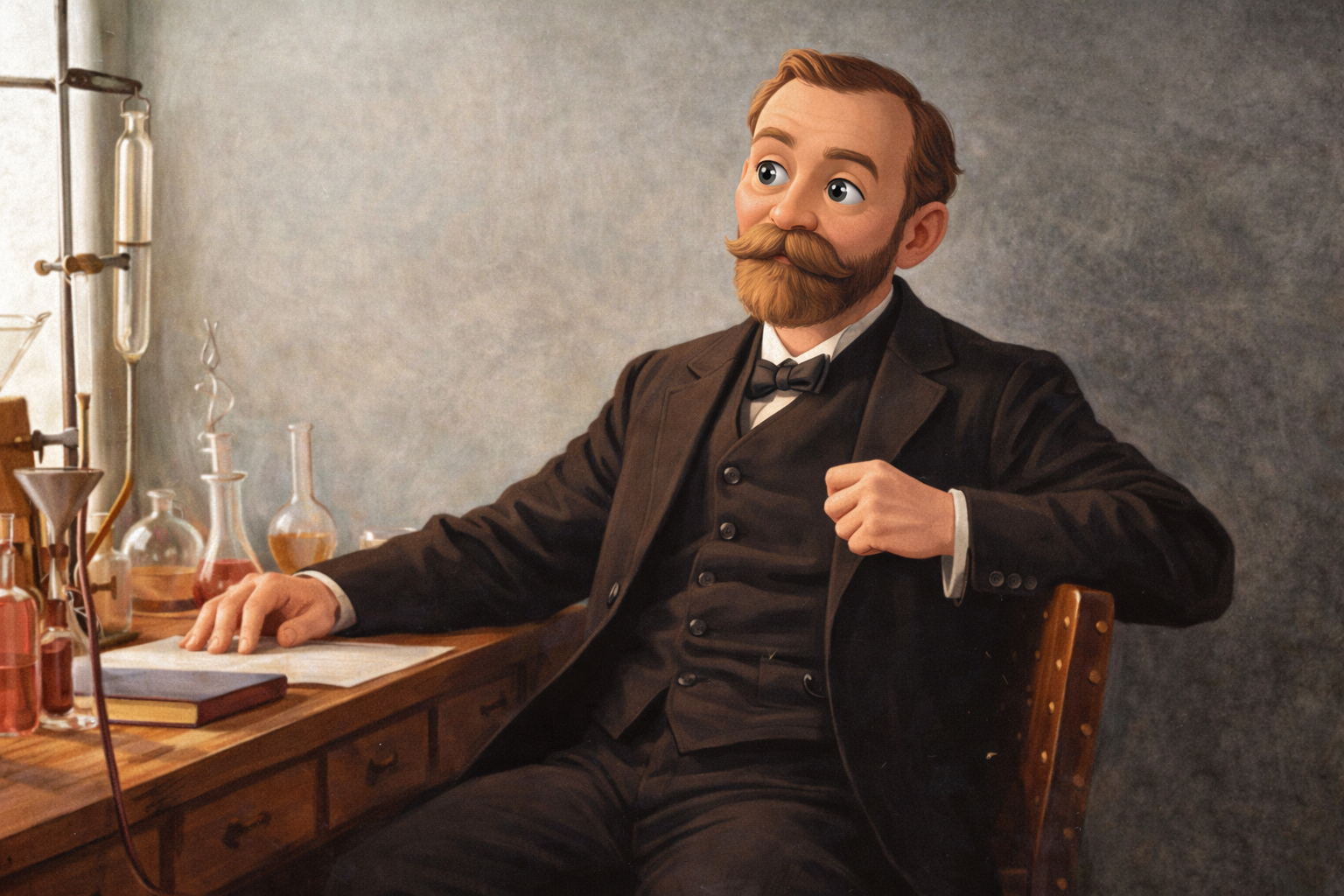Alfred Bernhard Nobel was born on October 21, 1833, in Stockholm, Sweden, into a family of engineers and inventors. His father, Immanuel Nobel, was an ambitious inventor who faced multiple financial failures but instilled in Alfred the spirit of curiosity and perseverance.
By the age of 17, Alfred was fluent in Swedish, Russian, French, English, and German.
Fascinated by literature, Alfred wanted to become a poet. However, his father disapproved and instead sent him to study chemistry and engineering abroad.
In Paris, he trained under the famous chemist Théophile-Jules Pelouze, where he was introduced to nitroglycerin, a volatile liquid that would shape the rest of his life.
Invention of Dynamite
During the mid-19th century, nitroglycerin was known for its explosive power but was dangerously unstable. Alfred Nobel dedicated himself to taming its force.
In 1867, after years of experimentation and a personal tragedy — the death of his younger brother Emil in a nitroglycerin explosion — Nobel invented dynamite, a safer and more stable form of the compound.
“My dynamite will sooner lead to peace than a thousand world conventions. As soon as men find that in one instant, whole armies can be utterly destroyed, they surely will abide by golden peace.”
His invention was initially celebrated for revolutionizing construction and mining. But it was also swiftly adopted for military use, much to Nobel’s dismay.
The Wrong Obituary
In 1888, Alfred Nobel’s brother Ludvig died. A French newspaper mistakenly published Alfred’s obituary with the headline:
“The merchant of death is dead.”
It described him as a man
“who became rich by finding ways to kill more people faster than ever before.”
This moment was a profound shock for Nobel. It forced him to re-evaluate his legacy. He didn’t want to be remembered for destruction but for progress, peace, and the betterment of humanity.
This led him to draft a new will.
A Legacy of Peace and Progress
In his will, Nobel left 94% of his vast fortune — equivalent to over $250 million today — to establish the Nobel Prizes. These awards would honor those who “have conferred the greatest benefit to mankind” in Physics, Chemistry, Medicine, Literature, and Peace.
The first Nobel Prizes were awarded in 1901, and they have since become the gold standard for recognizing excellence and service to humanity.
“Every man ought to have the chance to contribute something to the world before he dies.”
He never married, and he lived his later years in solitude, often reflecting on human nature, ethics, and the future.
Nobel passed away on December 10, 1896, in San Remo, Italy. He left behind not only revolutionary inventions but a legacy that continues to inspire scientists, artists, and peacebuilders across the world.
Timeless Inspiration
Nobel’s life is a lesson in transformation. A man who made explosives ultimately devoted his life to celebrating human achievement and peace.
“Hope is nature’s veil for hiding truth’s nakedness.”
His story teaches us that it’s never too late to change the narrative of our lives, to choose legacy over wealth, and to be remembered for what we give rather than what we gain.
He held 355 patents and left behind a remarkable legacy—not just as an inventor, but as a visionary who sought to use science and innovation to promote peace and human progress.
A Riddle
You say I am a riddle – it may be
For all of us are riddles unexplained.
Begun in pain, in deeper torture ended,
This breathing clay what business has it here?
Some petty wants to chain us to the Earth,
Some lofty thoughts to lift us to the spheres,
And cheat us with that semblance of a soul
To dream of Immortality, till Time
O’er empty visions draws the closing veil,
And a new life begins – the life of worms,
Those hungry plunderers of the human breast.
For this Hope dwindles as we fathom Truth:
Forgotten to forget – and is that all?
To-day a man, with power to act and feel,
A mirror of the Universe, wherein
Creation’s centred rays combine to form
The focus of Intelligence; to-day
A heart so deeply loving that it seems
As if that band uniting soul to soul,
Were but Religion in a brighter form;
To-day all this – to-morrow a cold corpse,
A something worse than clay which stinks and rots.
Kind hands may strew their flowers, kind eyes may drop
A tear of pity o’er the buried dust;
But worms will feed long after friends are gone,
And, after all, what matters love of theirs
When all of us, that was, is at an end.
“The capital … shall form a fund, the interest of which shall be distributed annually as prizes to those persons who shall have rendered humanity the best services during the past year. …
One-fifth to the person having made the most important discovery or invention in the science of physics, one-fifth to the person who has made the most eminent discovery or improvement in chemistry, one-fifth to the one having made the most important discovery with regard to physiology or medicine, one-fifth to the person who has produced the most distinguished idealistic work of literature, and one-fifth to the person who has worked the most or best for advancing the fraternization of all nations and for abolishing or diminishing the standing armies as well as for the forming or propagation of committees of peace.”
